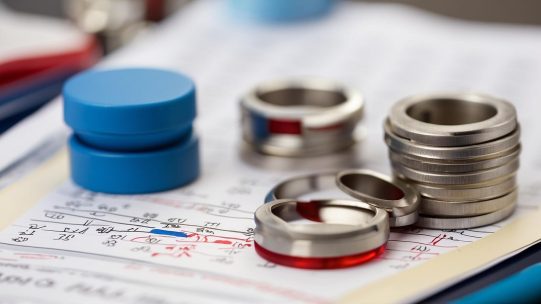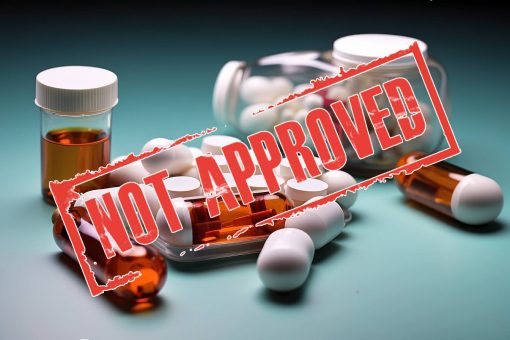Concomitant use of erectile dysfunction medications and common chest pain medications may increase risk of death

Phosphodiesterase type 5 inhibitors (PDE5i), marketed under names such as Viagra, Levitra and Sialis, are common drugs for the treatment of erectile dysfunction (ED) in men with cardiovascular disease (CVD). However, a new Swedish study published in the Journal of the American College of Cardiology suggests that patients are at risk for higher long-term morbidity and mortality when PDE5 inhibitors and nitrates are prescribed concomitantly.
Erectile dysfunction is common in middle-aged and elderly men and is a strong predictor of the development of coronary heart disease. Nitrates are commonly used to treat angina pectoris, or chest pain. Their concomitant use is contraindicated because both drugs can cause a decrease in blood pressure. However, there is little real clinical data on the effects of using them together, and the number of people prescribed both drugs continues to grow.
In this study, updated from a previous study using the same Swedish national dataset from the Swedish Patient Registry, we analyzed the association between PDE5i treatment and cardiovascular outcomes in men with stable coronary heart disease (CHD) treated with nitrates. PDE5i treatment is associated with cardiovascular morbidity and mortality The aim of the study is to resolve conflicting results regarding the effect of PDE5i treatment on the Daniel Peter Andersson, MD, associate professor of medicine at Karolinska Institute in Stockholm and senior author of the study, said: “Physicians are seeing an increasing demand for erectile dysfunction drugs from men with cardiovascular disease.” ED medications have a positive effect on men with CVD, but patients taking nitrates may be at increased risk for adverse health effects.”
The study included 61,487 men with a history of myocardial infarction (MI) or percutaneous coronary intervention (PCI) who received two prescriptions for nitrates within six months. Exposure was defined as at least two prescriptions for PDE5i drugs.
Of these men, 55,777 were treated with nitrates and 5,710 were treated simultaneously with nitrates and PDE5i. The median follow-up time for the entire cohort was 5.7 years for those taking nitrates alone and 3.4 years for those taking nitrates and PDE5i. The group taking nitrates with PDE5i was 61.2 years younger than the group taking nitrates alone, at 70.3 years.
The researchers performed multivariate Cox proportional hazards regression to estimate hazard ratios (HRs) and 95% confidence intervals (CIs) for various outcomes, including all-cause mortality, cardiovascular and non-cardiovascular mortality, myocardial infarction (MI), heart failure, cardiac revascularization, and major cardiovascular events (MACE).
Results of the study showed that the combination of PDE5i and nitrate treatment was associated with a higher risk of all outcomes compared with those taking nitrates alone: 28 days after PDE5i administration, few events occurred in those taking both PDE5i and nitrates, and fewer events occurred in those taking nitrates. The incidence of events was lower in those taking nitrates than in those taking nitrates, indicating a lower immediate risk of events.
Our aim is to emphasize the need for careful patient consideration before prescribing PDE5i to men taking nitrates. In addition, it justifies our efforts to continue to investigate the equivocal effects of ED medications in men with CVD.”
Limitations of this study include the inability to learn about patients’ adherence and medication habits, and the inability to infer a causal relationship between deaths from the data.
Researchers assessed medication use from filled prescriptions, but could not determine patients’ adherence to medication regimens and habits. The patient population also included high-risk individuals who had already undergone myocardial infarction or revascularization procedures. In addition, contrary to the guideline recommendations, they were prescribed nitrates at least twice and PDE5i at least twice.
Therefore, the findings cannot be fully generalized to the general population. Therefore, the findings cannot be fully generalized to the general population.
Glenn N. Levine, MD, of Baylor College of Medicine and Michael E. DeBakey Medical Center in Houston, stated in an accompanying editorial that ED administration of PDE5i is reasonably safe in patients with ischemic heart disease and mild angina pectoris and adequate exercise capacity – but not in patients not taking chronic nitrate therapy. Provided the patient is not taking chronic nitrate therapy,” he states. However, in patients taking chronic oral nitrate therapy, the use of PDE5i is at best disadvantageous and generally contraindicated.”
ED and SAD are, unfortunately, all too common conditions. However, as in most relationships, they can coexist for many years, and possibly a lifetime, with appropriate precautions and care.”
More information: Journal of the American College of Cardiology (2024).
Journal information: Journal of the American College of Cardiology









